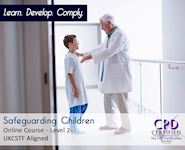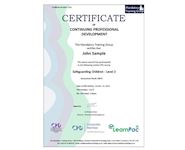
Safeguarding Children - Level 2 - Online Course - CPD Accredited
Instant Access | Includes Assessment & Certificate | UK CPD Accredited | Instant Certificate Download
Summary
- Exam(s) / assessment(s) is included in price
- Tutor is available to students
Add to basket or enquire
Overview
Safeguarding Children - Level 2 - Online Course - CPD Accredited.
Welcome to The Mandatory Training Group's online Safeguarding Children – Level 2 training course for front-line healthcare and social care providers.
All organisations that work with or come into contact with children should have adequate safeguarding policies and procedures to ensure that every child, regardless of their age, disability, gender reassignment, race, religion or belief, sex, or sexual orientation, has a right to equal protection from harm.
Setting up and following good safeguarding policies and procedures means children are safe from adults and other children who might pose a risk. This includes voluntary and community organisations, faith groups, private sector providers, as well as schools, hospitals and sports clubs.
Safeguarding Children - Level 2 - Online Course - CPD Accredited.
Study method – Online, self-paced
Estimated duration (Verifiable CPD hours) – 2 hours
Course format – Online (24/7 access)
Entry requirements – no prerequisites required
Assessment type – Complete end of course assessment (80% needed to pass and gain CPD certificate)
Certification/Qualification – Downloadable CPD certificate
Cost(s) of assessment and certification – Assessment and certification costs included in the course price
Course accreditation – CPD Certification Service (CPDUK)
Course access – Part-time (1-year access)
Course delivery – via desktop PC/MAC, laptops, tablets or smartphones.
Safeguarding Children - Level 2 - Online Course - CPD Accredited.
CPD
Course media
Resources
- Safeguarding Children - Level 2 - Online Course - The Mandatory Training Group - - download
Description
Course content
This online Safeguarding Children – Level 2 training course covers the following:
- An introduction to the fundamental principles of safeguarding children,
- Understanding why safeguarding children is essential,
- The Human Rights of Children – The United Nation’s Convention on the Rights of the Child (UNCRC),
- An understanding of what safeguarding children means,
- An awareness of vital safeguarding children legislation,
- An understanding of the standard terms used in safeguarding children,
- An understanding of the complex nature of child abuse,
- The ‘Toxic Trio’ concerning safeguarding children,
- An awareness of the main types of abuse in children and young people,
- An awareness of the dangers of radicalisation of children and young people,
- An awareness of the risks of child trafficking,
- Knowledge of female genital mutilation (FGM) in girls and young women,
- Understanding of the dangers (to children and young people) from the internet and social networking sites,
- Emerging themes about child protection, safeguarding children and young people,
- Knowing what to do if a child or young person discloses abuse,
- Knowing what to do if you suspect child abuse,
- Understanding your responsibilities in protecting children and young adults from abuse, and
- Where to find useful information and resources regarding the safeguarding of children (online child protection learning resources).
Course aims
The aims and objectives of this online Safeguarding Children – Level 2 training course are to:
- Provide a clear understanding of the legislation regarding the safeguarding of vulnerable children and young adults across the UK,
- Inform learners about their responsibilities in safeguarding vulnerable children and protecting them from harm, neglect and abuse,
- Prevent harm and to reduce the risk of abuse or neglect to children, and
- Provide essential child protection training resources in an engaging and meaningful way.
Learning outcomes
On completion of this online Safeguarding Children – Level 2 training course, the learner will:
- Be able to recognise potential indicators of child maltreatment – physical, emotional, sexual abuse, and neglect including radicalisation, child trafficking and female genital mutilation (FGM),
- Understand the impact a parent/carers physical and mental health can have on the well-being of a child or young person, including the effects of domestic violence,
- Understand the importance of children’s rights in the safeguarding/child protection context,
- Know what action to take if there are concerns, including to whom concerns should be reported and from whom to seek advice,
- Understand the risks associated with the internet and online social networking,
- Be aware of relevant legislation (i.e. Children Acts 1989, 2004 and the Sexual Offences Act 2003),
- Understand what constitutes child maltreatment and be able to identify any signs of child abuse or neglect,
- Be prepared to act as an effective advocate for a child or young person,
- Understand the potential impact of a parent’s/carer’s physical and mental health on the wellbeing of a child or young person to be able to identify a child or young person at risk,
- Be prepared to identify their professional role, responsibilities, and professional boundaries and those of colleagues in a multidisciplinary team and a multi-agency setting,
- Know-how and when to refer to social care if safeguarding/child protection is identified as a concern,
- Be able to document safeguarding/child protection concerns in a format that informs the relevant staff and agencies appropriately,
- Know how to maintain appropriate records including being able to differentiate between fact and opinion,
- Be prepared to identify the proper and relevant information and how to share it with other teams,
- Understand critical statutory and non-statutory guidance and legislation including the UN Convention on the Rights of the Child and Human Rights Act,
- Be aware of the risk of female genital mutilation (FGM) in specific communities, be willing to ask about FGM in the course of taking a routine history, know who to contact if a child makes a disclosure of impending or completed mutilation, be aware of the signs and symptoms and be able to refer appropriately for further care and support,
- Be mindful of the risk factors for radicalisation and know who to contact regarding preventive action and support for those vulnerable young persons who may be at risk of, or are being drawn into, terrorist-related activity, and
- Be able to identify and refer a child suspected of being a victim of trafficking and/or sexual exploitation.
This online Safeguarding Children – Level 2 training course covers the core learning outcomes per the Intercollegiate Document (2014). However, it needs to be emphasised that dependent upon role/speciality, there may be additional learning needs which will need to be addressed. While some of these needs can be addressed through training, some will be achieved through clinical experience and supervision.
Safeguarding Children - Level 2 - Online Course - CPD Accredited.
Who is this course for?
This online Safeguarding Children – Level 2 training course should be completed by those who work with children and young people, including:
- NHS medical, nursing, AHP and care staff,
- Locum doctors and nurses,
- Locum allied health professionals (AHPs),
- Agency nurses,
- Agency workers,
- Healthcare Assistants,
- Support workers,
- Care assistants,
- Nursery staff,
- Children’s services and
- Community services.
Safeguarding Children - Level 2 - Online Course - CPD Accredited.
Requirements
Learn anywhere, anytime on any device
You will need access to a desktop computer, laptop, tablet or smartphone device to complete these online courses. You can start, pause/stop and return to where you left off.
Our courses utilise responsive design features, making them available on any device of your choice.
Safeguarding Children - Level 2 - Online Course - CPD Accredited.
Career path
Our online courses and programmes range from introductory modules at Level 1 (awareness/beginner) to advanced and expert modules up to Level 6.
Our e-learning modules count towards CPD hours for professionals in various sectors as well as meeting mandatory and statutory requirements (where relevant).
Safeguarding Children - Level 2 - Online Course - CPD Accredited.
Questions and answers
Once you have passed how long does the qualification last?
Answer:Good morning Charlene, Thank you for contacting us. For the majority of our online courses, the certificates do not have an expiration date. Our Safeguarding Children Level 2 certification will be valid for 3 years. However, some sectors may require their employees to complete statutory and mandatory training annually, biannually or every three years. Should you require any further support, please do not hesitate to contact us. Kind regards Tim MTG Support Team
This was helpful.how do you register and start the course
Answer:Good morning Thank you for your message To enrol onto an e-learning course through our website, please add the course to your basket. From there, you will be able to go to our secure checkout page to complete your booking and make payment using credit/debit card. Once your payment has been confirmed, you will receive a booking confirmation email with a receipt. Thanks Support Team
This was helpful.How long does the course last for before refreashing the course?
Answer:Good afternoon Thank you for your message You have 365 days to complete the course upon your purchase date If you have any further questions, please let us know Thanks MTG Support Team
This was helpful.
Reviews
Provider
An overview of The Mandatory Training Group
The Mandatory Training Group is a leading accredited UK provider of healthcare and social care training courses. The Mandatory Training Group was founded by health care and social care professionals who have extensive occupational experience in various NHS, private sector and academic settings. We are an approved training centre with Training Qualifications UK (TQUK) offering a wide range of Ofqual approved training qualifications. We take time to fully understand each client’s training requirements. Our training solutions are tailored to ensure that the appropriate content is delivered by qualified trainers and assessors with the relevant occupational experience.
Who does The Mandatory Training Group support?
Health & Social Care Recruitment Agencies | Framework Agencies | NHS Trusts | CCG's | GP Practices & Surgeries | Healthcare Clinics | Dental Services | Residential Homes | Care Homes | Nursing Homes | Supported Living | Domiciliary Care Providers | Mental Health Organisations | Schools & Colleges | Nurseries | Charities | Training & Development Companies | Auditing & Inspecting Organisations + many more….
E-learning for individuals and organisations
The Mandatory Training Group are a UK accredited provider of online training courses. We have over 50 online courses available on our interactive learning management system (LMS). Our wide range of health and social care elearning courses help support care providers with compliance and support individuals working in the care industry meet statutory and regulatory requirements set by the Care Quality Commission (CQC). All of our online courses are aligned to the Skills for Health's UK Core Skills Training Framework (CSTF).
Legal information
This course is advertised on Reed.co.uk by the Course Provider, whose terms and conditions apply. Purchases are made directly from the Course Provider, and as such, content and materials are supplied by the Course Provider directly. Reed is acting as agent and not reseller in relation to this course. Reed's only responsibility is to facilitate your payment for the course. It is your responsibility to review and agree to the Course Provider's terms and conditions and satisfy yourself as to the suitability of the course you intend to purchase. Reed will not have any responsibility for the content of the course and/or associated materials.




